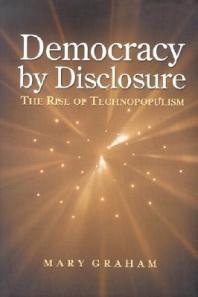Product desciption
Democracy By Disclosure The Rise Of Technopopulism Mary Graham by Mary Graham 9780815732334, 0815732333 instant download after payment.
In December 1999, the Institute of Medicine shocked the nation by reporting that as many as 98,000 Americans died each year from mistakes in hospitals--twice the number killed in auto accidents. Instead of strict rules and harsh penalties to reduce those risks, the Institute called for a system of standardized disclosure of medical errors. If it worked, it would create economic and political pressures for hospitals to improve their practices. Since the mid-1980s, Congress and state legislatures have approved scores of new disclosure laws to fight racial discrimination, reduce corruption, and improve services. The most ambitious systems aim to reduce risks in everyday life--risks from toxic pollution, contaminants in drinking water, nutrients in packaged foods, lead paint, workplace hazards, and SUV rollovers. Unlike traditional government warnings, they require corporations and other organizations to produce standardized factual information at regular intervals about risks they create. Legislated transparency has become a mainstream instrument of social policy. Mary Graham argues that these requirements represent a remarkable policy innovation. Enhanced by computers and the Internet, they are creating a new techno-populism--an optimistic conviction that information itself can improve the lives of ordinary citizens and encourage hospitals, manufacturers, food processors, banks, airlines, and other organizations to further public priorities. Drawing on detailed profiles of disclosure systems for toxic releases, nutritional labeling, and medical errors, Graham explains why the move toward greater transparency has flourished during a time of regulatory retrenchment and why corporations have often supported these massive raids on proprietary information. However, Democracy by Disclosure, sounds a cautionary note. Just as systems of financial disclosure have come under new scrutiny in the wake of Enron's collapse, systems of social disclosure deserve car


